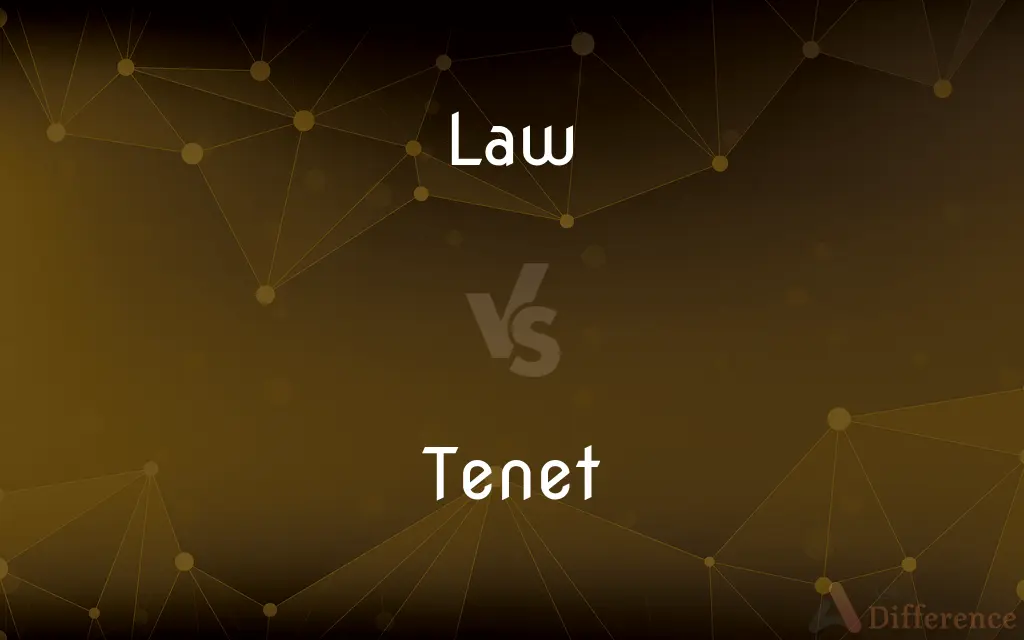Law vs. Tenet — What's the Difference?
Edited by Tayyaba Rehman — By Maham Liaqat — Updated on May 5, 2024
Law refers to rules enforced by governmental authority; tenet, to a principle or belief, typically of a religion or philosophy.

Difference Between Law and Tenet
Table of Contents
ADVERTISEMENT
Key Differences
Law is a system of rules that are created and enforced by governmental institutions to regulate behavior, with legal consequences for violations. Tenet, on the other hand, refers to a principle or belief that forms the foundation of a theory, religion, or philosophy, adhered to by personal choice or communal tradition.
Laws are mandatory and have specific legal implications, whereas tenets are voluntarily followed and primarily have moral or ethical implications. Law often changes in response to societal needs and shifts in political climates, while tenets tend to be more stable, reflecting long-standing philosophical or religious values.
Laws require enforcement mechanisms like police and courts; tenets rely on moral or spiritual enforcement through communal pressures or personal conviction.
The violation of a law leads to legal penalties such as fines or imprisonment, whereas the breach of a tenet might result in social ostracism or spiritual consequences.
Comparison Chart
Nature
Legally binding rules
Voluntary principles or beliefs
ADVERTISEMENT
Enforcement
Enforced by governmental authorities
Self-enforced or enforced by community norms
Consequences
Legal penalties (fines, imprisonment)
Moral or social repercussions
Stability
Can change with legislation
Generally stable, changes less frequently
Basis
Societal needs, justice, order
Religious, philosophical, or ethical beliefs
Compare with Definitions
Law
A rule established by authority, society, or custom.
The law requires that all drivers stop at red lights.
Tenet
A principle or belief held to be true by an individual or group.
Non-violence is a central tenet of their philosophy.
Law
The principles applied in the courts of justice.
The case was tried according to the established law.
Tenet
A core assumption that cannot be dispensed with without affecting the viability or integrity of a belief system.
The tenets of his theory have influenced numerous other studies.
Law
A statute enacted by a legislative body.
New laws were passed to improve road safety.
Tenet
A guiding principle for behavior or thought.
She follows the tenet that honesty is the best policy.
Law
The system of rules that a particular country or community recognizes as regulating the actions of its members.
She practices law in New York.
Tenet
An opinion, doctrine, or principle held as being true by someone or especially an organization.
The tenets of democracy are widely accepted across the globe.
Law
The legal profession.
He decided to pursue a career in law after graduating.
Tenet
A foundational belief that informs particular actions or policies.
The company's tenets include integrity and customer satisfaction.
Law
Law is a system of rules created and enforced through social or governmental institutions to regulate behavior, with its precise definition a matter of longstanding debate. It has been variously described as a science and the art of justice.
Tenet
A principle or belief, especially one of the main principles of a religion or philosophy
The tenets of classical liberalism
Law
A rule of conduct or procedure established by custom, agreement, or authority.
Tenet
A doctrine, principle, or position held as part of a philosophy, religion, or field of endeavor.
Law
The body of rules and principles governing the affairs of a community and enforced by a political authority; a legal system
International law.
Tenet
An opinion, belief, or principle that is held as absolute truth by someone or especially an organization.
Law
The condition of social order and justice created by adherence to such a system
A breakdown of law and civilized behavior.
Tenet
Any opinion, principle, dogma, belief, or doctrine, which a person holds or maintains as true; as, the tenets of Plato or of Cicero.
That al animals of the land are in their kind in the sea, . . . is a tenet very questionable.
The religious tenets of his family he had early renounced with contempt.
Law
A set of rules or principles dealing with a specific area of a legal system
Tax law.
Criminal law.
Tenet
A religious doctrine that is proclaimed as true without proof
Law
A statute, ordinance, or other rule enacted by a legislature.
Law
A judicially established legal requirement; a precedent.
Law
The system of judicial administration giving effect to the laws of a community
All citizens are equal before the law.
Law
Legal action or proceedings; litigation
Submit a dispute to law.
Law
An impromptu or extralegal system of justice substituted for established judicial procedure
Frontier law.
Law
An agency or agent responsible for enforcing the law. Often used with the
"The law ... stormed out of the woods as the vessel was being relieved of her cargo" (Sid Moody).
Law
(Informal) A police officer. Often used with the.
Law
The science and study of law; jurisprudence.
Law
Knowledge of law.
Law
The profession of an attorney.
Law
Something, such as an order or a dictum, having absolute or unquestioned authority
The commander's word was law.
Law
A body of principles or precepts held to express the divine will, especially as revealed in the Bible.
Law
The first five books of the Hebrew Scriptures.
Law
A code of principles based on morality, conscience, or nature.
Law
A rule or custom generally established in a particular domain
The unwritten laws of good sportsmanship.
Law
A way of life
The law of the jungle.
Law
A statement describing a relationship observed to be invariable between or among phenomena for all cases in which the specified conditions are met
The law of gravity.
Law
A generalization based on consistent experience or results
The law of supply and demand.
Law
(Mathematics) A general principle or rule that is assumed or that has been proven to hold between expressions.
Law
A principle of organization, procedure, or technique
The laws of grammar.
The laws of visual perspective.
Law
(usually with "the") The body of binding rules and regulations, customs, and standards established in a community by its legislative and judicial authorities.
The courts interpret the law but should not make it.
In theory, entrapment is against the law.
Law
The body of such rules that pertain to a particular topic.
Property law
Commercial hunting and fishing law
Law
Common law, as contrasted with equity.
Law
A binding regulation or custom established in a community in this way.
There is a law against importing wallabies.
A new law forbids driving on that road.
The court ruled that the executive order was not law and nullified it.
Law
(more generally) A rule, such as:
Law
Any rule that must or should be obeyed, concerning behaviours and their consequences. mores.}}
"Do unto others as you wish them to do unto you" is a good law to follow.
The law of self-preservation
Law
A rule or principle regarding the construction of language or art.
The laws of playwriting and poetry
Law
A statement (in physics, etc) of an (observed, established) order or sequence or relationship of phenomena which is invariable under certain conditions. theory.}}
The laws of thermodynamics
Newton's third law of motion states that to every action there is always an equal and opposite reaction.
This is one of several laws derived from his general theory expounded in the Philosophiæ Naturalis Principia Mathematica.
Law
A statement (of relation) that is true under specified conditions; a mathematical or logical rule.
Mathematical laws can be proved purely through mathematics, without scientific experimentation.
Law
Any statement of the relation of acts and conditions to their consequences.
The law of scarcity
The law of supply and demand
Law
(linguistics) A sound law; a regular change in the pronunciation of a language.
Grimm's law
Dahl's law
Law
(cricket) One of the official rules of cricket as codified by the its (former) governing body, the MCC.
Law
The control and order brought about by the observance of such rules.
They worked to maintain law and order.
It was a territory without law, marked by violence.
Law
(informal) A person or group that act(s) with authority to uphold such rules and order (for example, one or more police officers).
Here comes the law — run!
Then the law arrived on the scene
Law
The profession that deals with such rules (as lawyers, judges, police officers, etc).
He is studying for a career in law.
She has practiced law in New York for twenty years.
Law
Jurisprudence, the field of knowledge which encompasses these rules.
She went to university to study law.
Law
Litigation; legal action (as a means of maintaining or restoring order, redressing wrongs, etc).
They were quick to go to law.
Law
An allowance of distance or time (a head start) given to a weaker (human or animal) competitor in a race, to make the race more fair.
Law
(aviation) A mode of operation of the flight controls of a fly-by-wire aircraft.
Normal law; alternate law; direct law
Law
(fantasy) One of two metaphysical forces ruling the world in some fantasy settings, also called order, and opposed to chaos.
Law
An oath sworn before a court, especially disclaiming a debt. wager of law", "wage one's law", "perform one's law", "lose one's law".}}
Law
(obsolete) A tumulus of stones.
Law
A hill.
Law
A score; share of expense; legal charge.
Law
(obsolete) To work as a lawyer; to practice law.
Law
To prosecute or sue (someone), to litigate.
Law
(nonstandard) To rule over (with a certain effect) by law; to govern.
Law
(informal) To enforce the law.
Law
To subject to legal restrictions.
Law
(dated) An exclamation of mild surprise; lawks.
Law
In general, a rule of being or of conduct, established by an authority able to enforce its will; a controlling regulation; the mode or order according to which an agent or a power acts.
These are the statutes and judgments and laws, which the Lord made.
The law of thy God, and the law of the King.
As if they would confine the Interminable . . . Who made our laws to bind us, not himself.
His mind his kingdom, and his will his law.
Law
In morals: The will of God as the rule for the disposition and conduct of all responsible beings toward him and toward each other; a rule of living, conformable to righteousness; the rule of action as obligatory on the conscience or moral nature.
Law
The Jewish or Mosaic code, and that part of Scripture where it is written, in distinction from the gospel; hence, also, the Old Testament.
What things soever the law saith, it saith to them who are under the law . . . But now the righteousness of God without the law is manifested, being witnessed by the law and the prophets.
Law
An organic rule, as a constitution or charter, establishing and defining the conditions of the existence of a state or other organized community.
Law
In philosophy and physics: A rule of being, operation, or change, so certain and constant that it is conceived of as imposed by the will of God or by some controlling authority; as, the law of gravitation; the laws of motion; the law heredity; the laws of thought; the laws of cause and effect; law of self-preservation.
Law
In mathematics: The rule according to which anything, as the change of value of a variable, or the value of the terms of a series, proceeds; mode or order of sequence.
Law
In arts, works, games, etc.: The rules of construction, or of procedure, conforming to the conditions of success; a principle, maxim; or usage; as, the laws of poetry, of architecture, of courtesy, or of whist.
Law
Collectively, the whole body of rules relating to one subject, or emanating from one source; - including usually the writings pertaining to them, and judicial proceedings under them; as, divine law; English law; Roman law; the law of real property; insurance law.
Law
Legal science; jurisprudence; the principles of equity; applied justice.
Reason is the life of the law; nay, the common law itself is nothing else but reason.
Law is beneficence acting by rule.
And sovereign Law, that state's collected willO'er thrones and globes elate,Sits empress, crowning good, repressing ill.
Law
Trial by the laws of the land; judicial remedy; litigation; as, to go law.
When every case in law is right.
He found law dear and left it cheap.
Law
An oath, as in the presence of a court.
Law
An exclamation of mild surprise.
Law
Legal document setting forth rules governing a particular kind of activity;
There is a law against kidnapping
Law
The collection of rules imposed by authority;
Civilization presupposes respect for the law
The great problem for jurisprudence to allow freedom while enforcing order
Law
A generalization that describes recurring facts or events in nature;
The laws of thermodynamics
Law
A rule or body of rules of conduct inherent in human nature and essential to or binding upon human society
Law
The learned profession that is mastered by graduate study in a law school and that is responsible for the judicial system;
He studied law at Yale
Law
The force of policemen and officers;
The law came looking for him
Law
The branch of philosophy concerned with the law and the principles that lead courts to make the decisions they do
Common Curiosities
What is a tenet?
A core belief or principle, often related to religion or philosophy.
How are laws enforced?
Through governmental institutions like courts and police.
Who enforces tenets?
Enforced by individual or community adherence to beliefs.
Are tenets flexible?
Generally stable, but can evolve with new interpretations or insights.
What happens if a law is broken?
Legal consequences, such as fines or imprisonment.
What happens if a tenet is not followed?
Typically, social or spiritual consequences.
Can someone opt out of a tenet?
Yes, adherence to tenets is based on personal or group belief.
What is a law?
A rule enforced by governmental authority to maintain order and protect rights.
Are tenets universally applicable?
Tenets are specific to those who accept the underlying belief system.
Can laws be changed?
Yes, through legislative processes and amendments.
What is an example of a tenet?
The belief in non-violence as espoused by many religions.
Do laws apply to everyone?
Laws apply universally within the jurisdiction they are enacted.
How do laws reflect society?
Laws often mirror the current values and needs of the society they govern.
Can someone opt out of a law?
No, laws are mandatory for everyone within the jurisdiction.
What is an example of a law?
Traffic laws that regulate driving behavior.
Share Your Discovery

Previous Comparison
Seminar vs. Tutorial
Next Comparison
Butane vs. IsobutaneAuthor Spotlight
Written by
Maham LiaqatEdited by
Tayyaba RehmanTayyaba Rehman is a distinguished writer, currently serving as a primary contributor to askdifference.com. As a researcher in semantics and etymology, Tayyaba's passion for the complexity of languages and their distinctions has found a perfect home on the platform. Tayyaba delves into the intricacies of language, distinguishing between commonly confused words and phrases, thereby providing clarity for readers worldwide.
















































